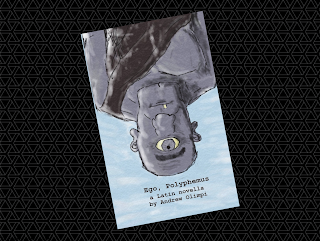Pīsō Ille Poetulus
 Pīsō Ille Poetulus (Piso the Little Poet) is a sheltered-vocabulary Latin novella published by Lance Piantaggini in 2016. It tells the story of Piso, a Roman boy who aspires to reject a military career and pursue his passion of becoming a poet. To impress his father, he goes around Rome writing hexameter poetry about the landmarks. It is notable for including simple hexameter verses alongside explanations of the details of these verses in comprehensible Latin.
Pīsō Ille Poetulus (Piso the Little Poet) is a sheltered-vocabulary Latin novella published by Lance Piantaggini in 2016. It tells the story of Piso, a Roman boy who aspires to reject a military career and pursue his passion of becoming a poet. To impress his father, he goes around Rome writing hexameter poetry about the landmarks. It is notable for including simple hexameter verses alongside explanations of the details of these verses in comprehensible Latin.Available from the author's website (bulk discounts available), from the CI Bookshop (Europe), or from Amazon.
Reading level
The author’s introduction states that this novella is for learners in their first or second year of study. Comprehensible Antiquity puts this novella at Level D. In his ranking of 13 novellas, John Piazza ranks it as the fifth-hardest.
Diverse & Multicultural Identities
For information about how representation of multicultural and diverse identities is analyzed in LNDb, see here.Parallel cultures
No depictions identified.Gender
Features one cis male main character (Piso). Features no cis female main characters or transgender main characters.Sexual identity
Features a depiction of heterosexual identity: Piso has a father and mother.SES/class
No depictions identified.Religion
No depictions identified. (Piso visits Roman temples, but no religious practices are depicted.)Disability
No depictions identified.Language Statistics
Vocabulary
Word List
A complete word list for Pīsō Ille Poetulus can be found here.
Glosses
This novella contains glosses in the form of both footnotes with English translations.
Of the 155 unique words (not counting proper nouns) used in the text, 47.0 of them (30.3%) are glossed at their first appearance in the text. Of the 2817 total words in the text, 107.0 of them (3.8%) are glossed.
Of the 155 unique words (not counting proper nouns) used in the text, 47.0 of them (30.3%) are glossed at their first appearance in the text. Of the 2817 total words in the text, 107.0 of them (3.8%) are glossed.
Glossary
This novella contains a Latin-English glossary, with every form of each word listed separately. The glossary is complete.
Syntax
The ratio of complex sentences indicates what proportion of the total sentences are complex sentences, on average. A complex sentence is defined as a sentence with one or more subordinate clauses or verb phrases.
Summary
Genre & Sources
This novella is in the genre of historical (Classical).
It contains numerous references to Vergil, Piso’s idol, and quotes the opening line of the Aeneid. Martial is also referenced.
It contains numerous references to Vergil, Piso’s idol, and quotes the opening line of the Aeneid. Martial is also referenced.
Complete Plot Summary
CONTAINS SPOILERS
Piso is a Roman boy who wants to be a poet, but his family disapproves and wants him to be a soldier instead. He has a dream that a soldier is taking him away to be in the army. He decides that he will write a poem about Rome, because his father likes Rome and that will make him proud. He goes into the Forum and looks at the columns. The columns start speaking to him: they are incarnations of the Muses. They tell him that they will give him the inspiration he needs to write poetry. Piso goes all around Rome writing poems—to the Palatium, Circus Maximus, Forum, Temple of Janus, Flavian Amphitheater, Pantheon—and eventually writes a poem to show to his father when he returns from war. At a certain point, he has another dream that a giant Muse is telling him he must join the army. When the army returns, Piso goes to see his father, but does not see his father returning. The last sentence calls into question whether this is a dream or this is real.
First 100 Words
Underlined words are glossed in the text. See also the preview found here.salvē! nōmen mihi est Pīsō. in urbe, Rōmā, habitō. puer Rōmānus sum. annōs octō(8) nātus sum. puer parvus sum, sed poēta magnus esse volō. māter iam mē audit…
māter: “Quōcum loqueris, Pīsō? Quid est dē poētīs? puer bonus Rōmānus dēbet esse mīles nōn poēta! nōnne vīs esse mīles sīcut pater? Quid agunt poētae?”
Pīsō nōn loquitur. ad mēnsam it.
Quid agunt poētae? QUID AGUNT POĒTAE?! poētae versūs pulchrōs scrībunt, et carmina pulchra canunt. ecce, versus:
“arma virumque canō, Trōiae quī prīmus ab ōrīs”
versus pulcher est, sed nōn est versus meus. versum nōn scrīpsī. Vergilius versum scrīpsit.
Supplementary Materials
The author has created numerous supplementary materials, including a teacher's guide, student workbook, a tiered version of the book which contains the text at three different reading levels, and audio tracks with recordings of Piso's poetry. All of these supplementary materials are available together in a bundle on the author's website.Presentation
| Illustrations? | yes |
| Illustrator | Lauren Aczon |
| Macrons? | yes |
| Font | Verdana |
| Pages of story | 52 |
| Total pages | 106 |
| Chapters | 12 |
Key Information
| Publication date | November 14, 2016 |
| Publisher | Poetulus Publishing |
| ISBN | 1539878236 |
| ISBN-13 | 978-1539878230 |

